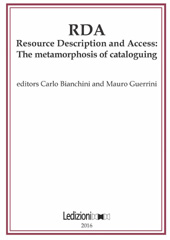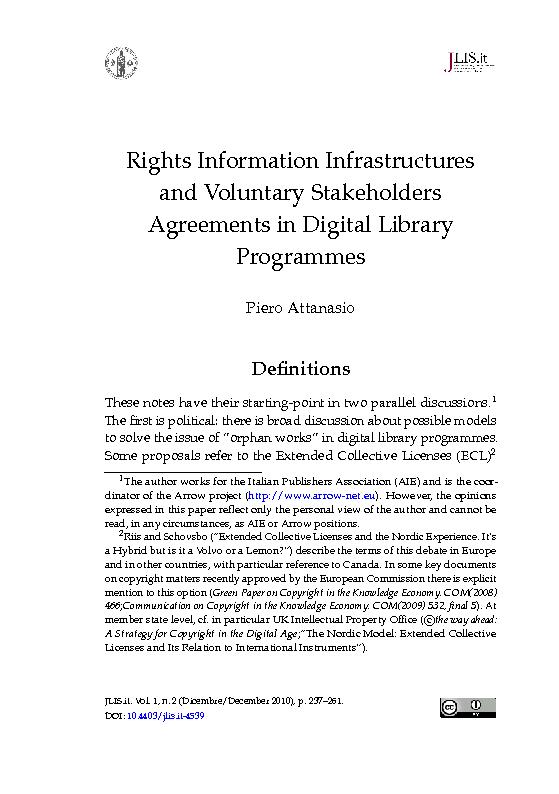Rights Information Infrastructures and Voluntary Stakeholders Agreements in Digital Library Programmes
237-261 p.
La gestione dei diritti delle opere testuali digitalizzate è analizzata attraverso specifici esempi e possibili soluzioni applicative. Uno dei più diffusi metodi di amministrazione è il Voluntary Stakeholders Agreements (VSA), un accordo molto elastico negoziato tra le associazioni di diritti d'autore e i possibili utenti delle opere. A questo proposito, si sono sviluppate Rights Information Infrastructure, progetti specificamente finalizzati all'amministrazione dei diritti delle opere digitalizzate dalle biblioteche. L'attuale pratica di VSA necessita tuttavia di una revisione, poiché non riesce a soddisfare in modo completo i bisogni degli autori e delle istituzioni che digitalizzano le opere.
Le biblioteche hanno raggiunto in alcuni paesi accordi che prevedono parziali diritti di sfruttamento: tutti tipi di opera con una licenza limitata (Norvegia), oppure un utilizzo completo, compreso di libera diffusione su internet, ma solo per alcuni tipi di opere, ad esempio quelle pubblicate prima di una certa data e ormai fuori stampa (Danimarca, Germania, Francia e Google). Il futuro sviluppo nella fruizione delle risorse digitalizzate e nel loro libero utilizzo da parte delle biblioteche è legato necessariamente a quello dei costi, costituiti dall'identificazione dello stato giuridico (di pubblico dominio o sotto copyright) e commerciale (in stampa o fuori catalogo) delle opere. [Testo dell'editore].
Rights management for digital library programs is affected by high transaction costs and this calls for new schemes of collective management. Voluntary Stakeholders Agreements (VSA) is proposed as a solution. However, there is a need to reshape the way of defining the scope of such agreements. In the past, the scope was set by limiting the type of uses licensed in the collective agreement, while other uses, pertaining the primary exploitation of works, remain in the sphere of direct management by the rightholder. In the agreements under discussion in several countries in relation to digital library initiatives, the scope is rather defined through limiting the type of works included in the agreement, while the licensed use is broad, including full making available in the Internet.
A key distinction is the commercial status of a work, if it is in-print or out-of-print.Such new VSAs require innovative forms of managing of rights information, i.e. set of metadata referred to rights management. A significant part of transaction costs derives from the search of rightholders, and thus there is a trend to call for reducing or even abolishing the need for this search. However, the identification of the right status (public domain vs. in-copyright) and the commercial status (in print vs. out of print) requires a title by title management of information, which is inevitable because of the characteristics of the emerging VSAs. The proper rightholder search cost should be assessed as an additional cost to something that is in the nature of the agreements. The paper tries to set the terms and conditions to achieve this assessment, and to figure out practical solutions to the problem. [Publisher's Text].
-
Articles from the same issue (available individually)
-
Information
DOI: 10.4403/jlis.it-4539
ISSN: 2038-1026
DISCIPLINES
KEYWORDS
- Digital libraries, Digitization projects, Copyright, Voluntary Stakeholders Agreements, Rights Information Infrastructure



